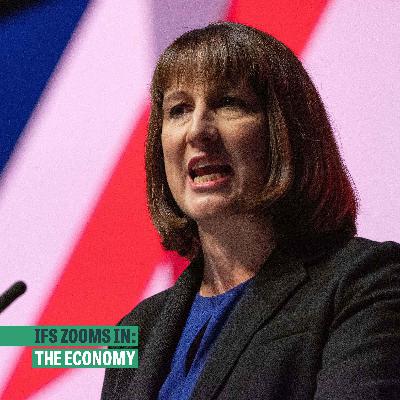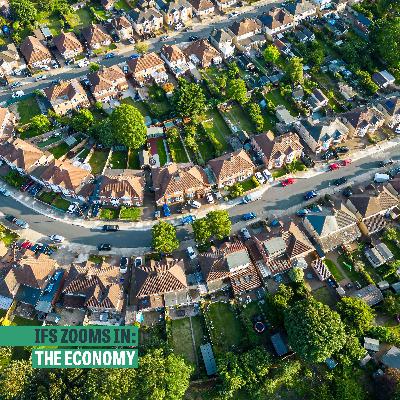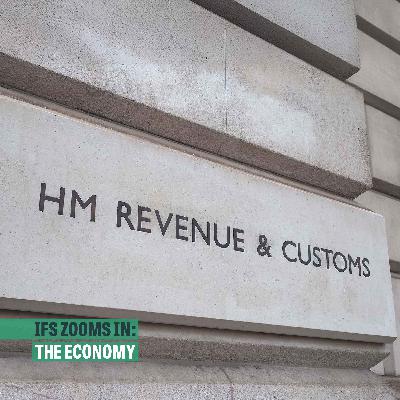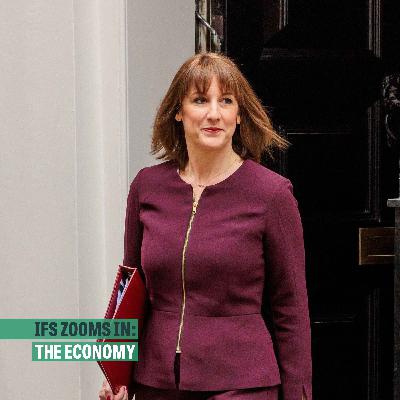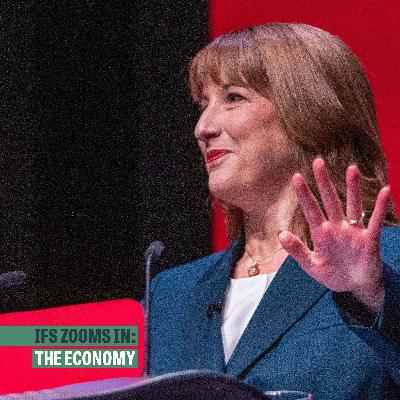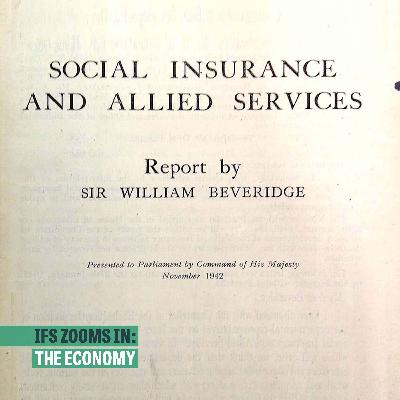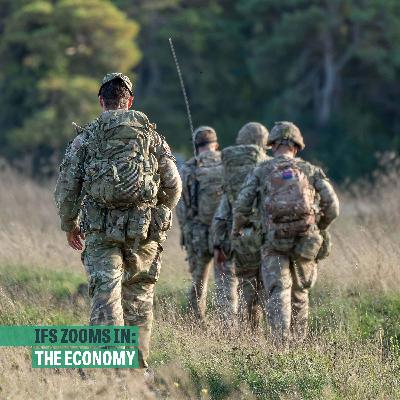Discover IFS Zooms In: The Economy
IFS Zooms In: The Economy

IFS Zooms In: The Economy
Author: Institute for Fiscal Studies
Subscribed: 253Played: 12,537Subscribe
Share
© Institute for Fiscal Studies
Description
Step beyond the headlines with in-depth, independent analysis from the experts at the Institute for Fiscal Studies. Hosted by IFS Director Helen Miller, this podcast brings you objective insights from the researchers shaping the debate.
Hosted on Acast. See acast.com/privacy for more information.
176 Episodes
Reverse
On average, students now leave university with just over £50,000 in student loan debt. Repayments are income-contingent: many graduates will repay little or nothing, while others repay 9% of their income above a threshold for decades, often watching the outstanding balance rise. That design has led some to argue the system is unfair and to argue that students were mis-sold loans whose terms have shifted over time.In this episode, Helen is joined by Nick Hillman, Director of the Higher Education Policy Institute and a former government adviser during the introduction of Plan 2 in the early 2010s, alongside Kate Ogen, Senior Research Economist at IFS, to unpack how the student loan system works in practice. We explain how the system has evolved across cohorts, how it differs across the UK, and when it makes sense to think of student finance as a loan versus a graduate tax. We also look at who repays what across the earnings distribution, how repayment thresholds shape lifetime payments, what changed with the move to Plan 5, and what recent policy choices mean for graduates and for the public finances.Finally, we discuss competing claims about “fairness”, between graduates and taxpayers, among graduates, and across generations, and ask the core question: who should pay for higher education?Become a member: https://ifs.org.uk/individual-membershipFind out more: https://ifs.org.uk/podcasts-explainers-and-calculators/podcasts Hosted on Acast. See acast.com/privacy for more information.
Inflation has fallen a long way from its peak - but many people still feel worse off, and price rises have remained stubbornly above the Bank of England’s 2% target. So what actually caused the big inflation spike, how close are we to “normal”, and what does that mean for households? Helen is joined by David Miles (OBR and former member of the Bank of England’s Monetary Policy Committee) and Peter Levell (IFS) to break down the basics: what inflation is, why central banks target 2% rather than 0%, and what drove prices up so sharply in recent years. We also dig into who inflation hits hardest, how much of the cost-of-living crisis is really about inflation, and why the Bank raises interest rates even though it can make life feel tougher in the short run. Become a member: https://ifs.org.uk/individual-membershipFind out more: https://ifs.org.uk/podcasts-explainers-and-calculators/podcasts Hosted on Acast. See acast.com/privacy for more information.
The UK minimum wage is one of the biggest economic policy changes of the past few decades. Introduced in 1999 at £3.60 an hour, it’s now over £12 and it shapes pay for a large share of the workforce. But what has it done to jobs? And if firms pay higher wages, where does the money come from - higher prices, lower profits, or higher productivity?In this episode, Helen is joined by Eduin Latimer (IFS) and Professor Alan Manning (LSE) to unpack what we do and don’t know about the minimum wage. We look at the evidence on employment effects, the knock-on impacts on pay compression, and whether the current minimum wage is set too high. Finally, we look ahead to the government’s ambitions, including faster rises for younger workers, and the trade-offs involved.Become a member: https://ifs.org.uk/individual-membershipFind out more: https://ifs.org.uk/podcasts-explainers-and-calculators/podcasts Hosted on Acast. See acast.com/privacy for more information.
The NHS holds a unique place in British life: a source of national pride, and the single biggest public service in England. This year it’s set to cost over £200 billion, around £3,500 per person, more than we spend on education, defence, justice and transport combined. And yet, despite sustained funding increases and around a quarter of a million more staff than in 2019, concerns about performance haven’t gone away.Labour came into office promising to get a grip on record waiting times, but progress so far looks limited. The waiting list stands at 7.3 million, only slightly down from around 7.6 million when the government took office a year and a half ago. With winter pressures, flu surges, and resident doctors taking strike action, it raises a big question: what’s actually going on inside the system, and is improvement realistically on the horizon?In this episode, Helen is joined by IFS colleagues Olly Harvey-Rich and Max Warner to unpack the data and the trade-offs. We look at winter pressures and capacity, what the latest performance metrics tell us, and the real constraints facing the NHS in England - money, productivity and system design. Finally, we look ahead to the rest of the parliament: should we be hopeful about meaningful change, or are the obstacles bigger than the plans?Become a member: https://ifs.org.uk/individual-membershipFind out more: https://ifs.org.uk/podcasts-explainers-and-calculators/podcasts Hosted on Acast. See acast.com/privacy for more information.
Moving into 2026, the government faces a critical period of delivery. After 18 months in power and several major fiscal events behind them, the focus is shifting from setting policy to seeing it through. However, with unemployment reaching 5.1% and a series of high-stakes reviews underway, the road ahead remains complex.In this episode, we are joined by Christine Farquharson and Tom Waters to examine the economic landscape for the year ahead. We look at the rising pressures on the public purse, from health-related benefits to the "national conversation" on SEND, and ask what the upcoming fiscal events might reveal about the government’s long-term strategy. We also look at what could shift the outlook, for better or worse, from public sector productivity to the economic impact of new technologies like AI and GLP-1 drugs.Become a member: https://ifs.org.uk/individual-membershipFind out more: https://ifs.org.uk/podcasts-explainers-and-calculators/podcasts Hosted on Acast. See acast.com/privacy for more information.
As ever the big-picture choices in the Budget dominated media coverage - but some of the most interesting changes were buried in the detail. From electric vehicles to tourist tax, how much do these quieter tax shifts really matter?In this episode, we dig into the lesser-noticed policies: why the government is offering upfront EV grants while planning a per-mile tax, how tweaks to salary sacrifice and cash ISAs could shape saving behaviour, and what the changes to EIS and EMI mean for investment and entrepreneurship. Joining Helen are Stuart Adam and Ben Zaranko from the IFS to break down what’s changed, why it matters, and what the “devil in the detail” tells us about the government’s tax strategy.Become a member: https://ifs.org.uk/individual-membershipFind out more: https://ifs.org.uk/podcasts-explainers-and-calculators/podcasts Hosted on Acast. See acast.com/privacy for more information.
This week on IFS Zooms In, host Helen Miller is joined by IFS economists Ben Zaranko and Christine Farquharson to unpack one of the biggest Autumn Budgets in years. With seventy-five policy measures, major tax and spending changes, and a striking shift in the economic forecasts, this was a Budget that surprised almost everyone.Helen, Ben and Christine break down:Why the expected “fiscal repair job” never arrivedHow a “lucky” surge in forecast tax receipts reshaped the Chancellor’s optionsThe major spending stories: abolishing the two-child limit, rising welfare pressures, SEND funding reform, and tighter departmental plansThe government’s tax decisions - from threshold freezes to the new ‘mansion tax’Whether any of this adds up to a credible long-term strategy for growthBecome a member: https://ifs.org.uk/individual-membershipFind out more: https://ifs.org.uk/podcasts-explainers-and-calculators/podcasts Hosted on Acast. See acast.com/privacy for more information.
As the Chancellor prepares her Budget, attention is turning not just to how she could raise more tax - but how she might cut spending. Where does the government actually spend its money? Why is it so difficult to reduce that spending in practice? And what would it take to genuinely pare back the size of the state?Helen Miller is joined by IFS colleagues Ben Zaranko and Tom Waters to unpack the realities behind public spending. They look at how the government’s budget is divided across welfare, public services, and investment; how pressures such as an ageing population, defence commitments and struggling services constrain choices; and whether efficiencies or productivity gains could ever plug the gap.Become a member: https://ifs.org.uk/individual-membershipFind out more: https://ifs.org.uk/podcasts-explainers-and-calculators/podcasts Hosted on Acast. See acast.com/privacy for more information.
The bond market plays a crucial role in shaping government spending decisions - but how much power does it really have? With a Budget around the corner, are investors or Rachel Reeves setting the limits on fiscal policy?In this episode, we unpack how the government borrows, why it’s so expensive right now, and what “fiscal credibility” really means. Joining Helen are Jack Meaning, Chief Economist at Barclays, and Ben Zaranko, IFS, to discuss the state of the bond market, the lessons from the Liz Truss era, and what investors will be watching for in the 2025 Budget.Become a member: https://ifs.org.uk/individual-membershipFind out more: https://ifs.org.uk/podcasts-explainers-and-calculators/podcasts Hosted on Acast. See acast.com/privacy for more information.
As the Chancellor prepares for her next Budget, attention is turning to how more tax revenue could be raised. What options are on the table - and what would they mean for households, businesses and the wider economy?Helen Miller is joined by IFS colleague Stuart Adam and tax expert Dan Neidle to explore the choices facing the Treasury. They discuss options from income tax and frozen thresholds to landlords, partnerships, pensions, and property taxes, asking which levers make sense and which should be left well alone.Recorded live as part of the ESRC Festival of Social Science.Become a member: https://ifs.org.uk/individual-membershipFind out more: https://ifs.org.uk/podcasts-explainers-and-calculators/podcasts Hosted on Acast. See acast.com/privacy for more information.
Why are chocolate-covered shortbread and plain shortbread taxed differently? The UK’s VAT system is full of bizarre inconsistencies that make it complex, inefficient, and unfair.In this episode, we dive into how VAT works, why economists tend to love it in theory, and why the UK’s version falls short in practice. We explore zero and reduced rates, exemptions, myths about regressivity, and discuss how simplifying VAT could make it fairer and less distortionary.In the fourth and final episode of our tax mini-series, Helen, Ben and Stuart look at how to fix one of the UK’s most important and misunderstood taxes.Become a member: https://ifs.org.uk/individual-membershipFind out more: https://ifs.org.uk/podcasts-explainers-and-calculators/podcasts Hosted on Acast. See acast.com/privacy for more information.
From council tax and stamp duty to business rates and taxes on landlords, the UK’s system for taxing property is complicated, inconsistent, and long overdue for reform.Homes aren’t just places to live - they’re also assets and a major form of saving - which makes deciding how to tax them especially tricky. In this episode, Helen is joined by Stuart Adam and Ben Zaranko to explore how property is currently taxed, what’s gone wrong, and how it could be made fairer and more efficient.Become a member: https://ifs.org.uk/individual-membershipFind out more: https://ifs.org.uk/podcasts-explainers-and-calculators/podcasts Hosted on Acast. See acast.com/privacy for more information.
In the second episode of our mini-series on how to fix the UK’s tax system, Helen is joined by Stuart Adam and Ben Zaranko to explore one of the most contentious areas of taxation - savings and wealth.Why do people who earn through investments often pay lower taxes than those earning a salary? Why do business owners and landlords sometimes end up both undertaxed and overtaxed? And could an annual wealth tax ever work in practice?This episode unpacks how the UK taxes savings, dividends, capital gains and inheritances, revealing the tensions at the heart of our system - and what a fair, efficient approach to taxing wealth might really look like.Become a member: https://ifs.org.uk/individual-membershipFind out more: https://ifs.org.uk/podcasts-explainers-and-calculators/podcasts Hosted on Acast. See acast.com/privacy for more information.
In the first episode of our new mini-series on how to fix the UK’s tax system, Helen is joined by Stuart Adam and Ben Zaranko to explore income tax - the cornerstone of government revenue, and one of the most confusing parts of our system. Why do we have two separate taxes on earnings? Why do odd kinks and cliff edges exist that distort behaviour? And what would a well-designed income tax actually look like?This episode dives deep into the structure of income tax and National Insurance, revealing how small design flaws create big inefficiencies - and what we can do to fix them.Become a member: https://ifs.org.uk/individual-membershipFind out more: https://ifs.org.uk/podcasts-explainers-and-calculators/podcasts Hosted on Acast. See acast.com/privacy for more information.
Rachel Reeves is once again facing tough choices on tax and spending. After promising no further tax rises last autumn, the Chancellor could now see a sizeable downgrade to the borrowing outlook - enough to wipe out the limited ‘headroom’ she built into her fiscal plans last spring. To stick to her ‘iron-clad’ rules, Reeves may now need a sizeable fiscal consolidation through tax rises, spending cuts, or both.Helen talks to IFS economists Carl Emmerson and Ben Zaranko about why we’re back here again, what’s really driving the UK’s fiscal challenges, and what options the Chancellor has to get the public finances back on track. They discuss whether Reeves can stick to her fiscal rules, what role productivity and growth forecasts play, and how the government could avoid fiscal 'ground hog' day again.This episode is part of the 2025 Green Budget, our annual report exploring the Chancellor’s options.📘 Read more: https://ifs.org.uk/publications/green-budget-2025-full-report💡 Become a member: https://ifs.org.uk/individual-membership Hosted on Acast. See acast.com/privacy for more information.
The two-child limit stops most families on Universal Credit from claiming support for a third or later child — worth about £3,500 a year per child. Introduced in 2017, it’s now at the centre of a political debate, with the Chancellor under pressure to scrap or reform it in the November Budget.Helen talks to IFS economists Tom Waters and Christine Farquharson about why the policy was introduced, how it’s affected families and child poverty, and what the options are for changing or removing it.Become a member: https://ifs.org.uk/individual-membershipFind out more: https://ifs.org.uk/podcasts-explainers-and-calculators/podcasts Hosted on Acast. See acast.com/privacy for more information.
From child benefit to winter fuel payments, debates over who really deserves support run through the history of the UK’s welfare state. In this episode of IFS Zooms In, we ask whether benefits should be universal, means-tested or contributory — and why the UK's benefits system has become one of the most means-tested in the developed world.Helen is joined by Nicholas Timmins (Institute for Government) and Tom Waters (IFS) to explore Beveridge’s original vision, the rise of means-testing and whether ideas like Universal Basic Income could work.Become a member: https://ifs.org.uk/individual-membershipFind out more: https://ifs.org.uk/podcasts-explainers-and-calculators/podcasts Hosted on Acast. See acast.com/privacy for more information.
The UK has promised to raise defence spending to levels not seen since the 1980s. That means tens of billions more pounds each year, with big implications for the armed forces, the economy, and the public finances.In this episode, Helen speaks to Matthew Savill (RUSI) and Max Warner (IFS) about what defence spending actually pays for, how it has changed over time, and what the government’s new commitments could mean for growth and future military capabilities.Become a member: https://ifs.org.uk/individual-membershipFind out more: https://ifs.org.uk/podcasts-explainers-and-calculators/podcasts Hosted on Acast. See acast.com/privacy for more information.
This week, we turn the tables and put your questions to the experts.From childcare and early years, to schools, apprenticeships, and family life — listeners sent in brilliant questions on the challenges facing children and young people today.Helen Miller is joined by Christine Farquharson and guests Carey Oppenheim, Sam Freedman, Philip Augar, and Anne Longfield to discuss:- Should mothers be supported to stay at home rather than return to work?- Has YouTube made teaching harder for schools?- How can we encourage more firms to offer apprenticeships and sponsorships?- What are the consequences of declining physical activity and play?👉 Share your thoughts in the comments, and don’t forget to subscribe for more evidence-based discussions from IFS Zooms In.Become a member: https://ifs.org.uk/individual-membershipFind out more: https://ifs.org.uk/podcasts-explainers-and-calculators/podcasts Hosted on Acast. See acast.com/privacy for more information.
Nearly a third of children in the UK live in relative poverty, and rising numbers face material deprivation. The government’s Opportunity Mission pledges that every child should grow up in a safe, loving home and that families should be able to afford the essentials — but how close are we to that goal?In this episode of IFS Zooms In, Helen Miller is joined by Christine Farquharson (IFS) and Baroness Anne Longfield (Centre for Young Lives; former Children’s Commissioner for England) to explore:- How family structures are changing and what that means for children- The impact of child poverty and financial insecurity- Why children’s social care is under growing pressure- What early intervention could do to improve outcomes👉 Don’t forget to subscribe for the final Q+A episode, where we put your questions to the experts.Become a member: https://ifs.org.uk/individual-membershipFind out more: https://ifs.org.uk/podcasts-explainers-and-calculators/podcasts Hosted on Acast. See acast.com/privacy for more information.









